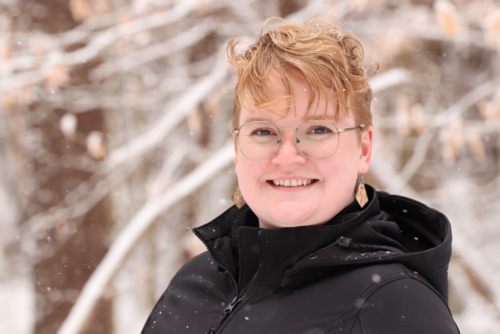
It is our pleasure to announce the 2025/26 Henry Roe Cloud fellow, Sarah LaVoy-Brunette. The Henry Roe Cloud Fellowship honors the legacy of Henry Roe Cloud (Ho-Chunk), a member of the Ho-Chunk Nation of Nebraska and graduate of Yale College, 1910. Since 2010, the Roe Cloud Fellowship has helped to develop American Indian Studies at Yale by facilitating the completion of the doctorate by scholars working on pressing issues related to the American Indian experience.
Sarah LaVoy-Brunette is an enrolled member of the White Earth Nation of Ojibwe and a PhD Candidate in the Medieval Studies Program with a Graduate Minor in American Indian and Indigenous Studies at Cornell University. Her dissertation project, “Converting the Wilderness: The Legacies of Settler Colonialism in Early Medieval England and Hodinǫ̱hsǫ́:nihgeh,” employs critical Indigenous studies to analyze the transcolonial legacies of settler colonialism and Indigenous erasure across the medieval-modern divide. Critically oriented around Place and the role of Land in identity formation, her work discusses the ways in which settler colonial ideologies are embedded in the literary, material, and visual cultures of early medieval England and exported later across Hodinǫ̱hsǫ́:nihgeh (Haudenosaunee homelands).
Sarah’s most recent peer-reviewed article, “Anglo-Saxonism and Indigenous Dispossession: Land-Grab Universities and the Emergence of Medieval Studies,” published in the preeminent journal for the field of medieval studies, Speculum, is an interdisciplinary collaboration that shows how medieval studies contributed to and profited from Indigenous dispossession both intellectually and materially. Specifically, the essay demonstrates that medieval studies served to justify the racial supremacy of the newly-minted Americans in the nineteenth century, to naturalize the foundational ideologies of legislation—such as the Land Grant College Act of 1862 (Morrill Act)—that operationalized Indigenous dispossession and American expansion, and to actively erase Indigenous histories and replace them with a mythic, medieval past once the field ensured its own institutionalization via the Morrill Act. She has another peer-reviewed collaborative article that appears in Medieval Ecocriticisms, and her artwork has been featured in numerous public exhibitions and publications.
Born and raised on the White Earth Reservation in northern Minnesota, Sarah chose to pursue a liberal arts education at the University of Minnesota, Morris, a public land-grant institution that is a former Native American boarding school and the only federally recognized four-year Native American-Serving Nontribal Institution (NASNTI) in the Upper Midwest. After receiving her Bachelor of Arts in Art History and Medieval Studies in 2019, Sarah began her graduate studies at Cornell University, New York State’s land-grant institution located on Gayogo̱hó:nǫˀgeh (Cayuga homelands). While at Cornell, she has been awarded the Summer Graduate Fellowship in Digital Humanities (2024), the Zhu Family Graduate Fellowship (2023–24), and the Dean’s McNair Fellowship (2019), and named a Graduate Dean’s Scholar (2019).
